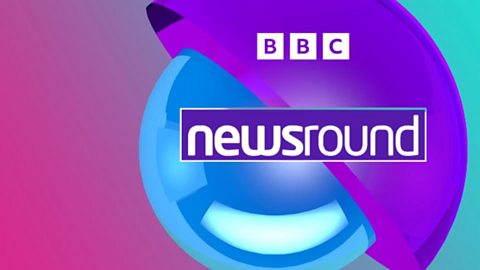Themes: celebrating the NHS; caring for others; working together; service.
Summary: 5 July 2023 marked the 75th anniversary of the NHS (National Health Service). The NHS is founded on the principle of high-quality healthcare being available to all, free at the point of delivery, regardless of income or other considerations. This assembly celebrates the work of the NHS, which we all rely on at some point in our lives, and explores how it is funded and how many different people come together to make it work.
Resources: The framework to download / print (pdf) and an image of the letters NHS to display.

The video
Krish's Mum: Almost ready to go home, Krish?
Krish: Yes. The doctor says my broken ankle is healing well, so I don't need to stay in hospital anymore.
Nurse May: Well that is excellent news.
Krish: I have a quick question, though. I keep seeing this blue rectangle with the letters N, H and S on it everywhere. What does that mean?
Nurse May: That's a very good question. It's the logo for the National Health Service or NHS.
Krish: What's the NHS?
Nurse May: It provides everyone in the country with free care when you get ill or injured or need a check-up from a doctor. The NHS pays for this hospital you're in now and it paid for us to take care of you and fix your leg.
Krish: Ah-ha.
Nurse May: But the NHS doesn't just look after hospitals, it pays for other things as well, like the ambulance that brought you here, any medicines you need to take and the doctor who is going to check up on you over the next few weeks. And once your leg is better, the NHS will also pay for your next trip to the dentist.
Krish: Wow, the NHS does so many different things, but how can it all be free?
Nurse May: It's paid for by taxes. That means that everyone who has a job and earns money in the UK gives a bit of their money to the government, some of which is then given to pay for the NHS. Then anyone who gets sick or breaks a bone can get the help when they need it. So you see, it's not really free because we're all helping to pay for it every day.
Krish: It must cost a lot of money.
Nurse May: It does.
Krish: I have 50p pocket money in my pocket. I could give that to the NHS to help.
Nurse May: That's very kind of you, Krish. But don't worry, you keep that. Maybe when you grow up and get a job, you might pay taxes to help pay for the NHS.
Krish: Do you pay taxes, mum to help pay for the NHS?
Krish's Mum: I do, yes.
Krish: Does the NHS work all over the world?
Nurse May: No, it's only in the UK. So England, Scotland, Wales and Northern Ireland. Other countries have different ways of caring for people. In some countries, you might pay for care at the time when you get ill or hurt yourself and in others you might save some money each month.
Krish: Like putting pocket money in a piggy bank.
Nurse May: Yes, a bit like that and then you have the money saved if you suddenly get ill and have to pay for your trip to hospital.
Krish's Mum: How many people work for the NHS?
Nurse May: Oh a lot. There are more than a million people who work for the NHS all over the country.
Krish: I met a doctor who was from India.
Nurse May: Yes, people come from all over the world to work for the NHS.
Krish: Amazing.
Nurse May: And the NHS looks after us from the moment we are born until we are very old.
Krish: Wow, that's a long time.
Nurse May: Yes, it is. And when you're young, you need different care from when you're old. So we have lots of different experts who have lots of different skills. You've probably met a few of them while you've been here.
Krish: I did, I met the paramedics who brought me in an ambulance. All the people who helped do the operation when they fixed my ankle and all the different doctors and nurses here on the ward.
Nurse May: And let's not forget all the other people who make sure everything in the hospital runs smoothly and safely, like the cooks, the porters and the cleaners.
Krish: So many people, it must be hard work caring for people.
Nurse May: It can be very hard work, but we all know that we are helping make people better and that's a very good feeling.
Krish's Mum: We should let Nurse May get back to work, Krish.
Krish: Well I have had the best time in hospital. Thank you to everyone for looking after me.
Nurse May: You're welcome. Now your mum will have to be your nurse until your ankle is fully better. But we'll be here if you need us again,
Krish: Great time for home. I can't wait to show my friends my cast.
The video is taken from our series Nurturing Nurses but is also suitable as a stand-alone resource. It is broadly appropriate for all age groups, but particularly aimed at KS1. For resources aimed at older groups see 'Where next?' below.
The animations in Nurturing Nurses cover the time a young boy called Krish spends in hospital following an ankle injury playing football. During his stay in hospital Krish learns about the history of nursing, including the work of a number of famous nurses - Florence Nightingale among them. He also learns how hospitals have changed as new technologies have emerged, such as x-ray machines.
In the final episode - presented here - Krish is about to leave hospital when he asks one of the nurses what the letters 'NHS' mean. The nurse tells Krish about the work of the National Health Service and how it might appear to be 'free' but is actually paid for through taxation. She goes on to describe some of the other services provided by the NHS and how it relies on the skills of many different people working together for a common goal.
Duration: 3' 52"
Final speech: 'I can't wait to show my friends my cast!'
Video questions
- Why has Krish been in hospital? (He has a broken ankle)
- What question does Krish ask the nurse? (What the letters NHS mean)
- What things does the nurse say the NHS pays for? (The hospital, the ambulance, medicines, the care workers, the dentist)
- How is the NHS funded? (Through taxation - most people who earn money will pay some to the government in taxes, which are then used to fund public services like the NHS)
- What countries are covered by the NHS? (Only the UK - England, Scotland, Wales and Northern Ireland)
- How many people does the nurse say work for the NHS? (More than 1 million)
- What NHS jobs are mentioned in the animation? (Paramedics, surgeons, doctors, nurses, cooks, porters, cleaners)

Key links
Assembly framework (pdf) document
Download / print the assembly framework ready for use
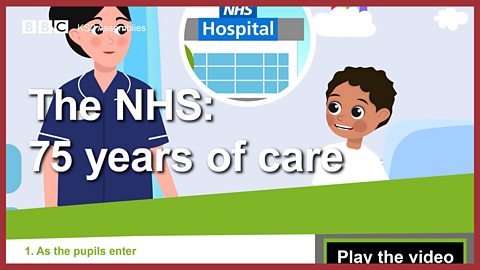
Image: the letters NHS
Click to display the image full-size
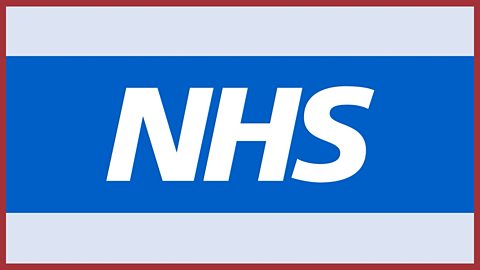

Suggested framework
1. Entry
You could play a song about saying 'thank you' - there are many to choose from! Or, if you intend to sing one of the songs below, you could play the instrumental version of it as pupils enter.
2. Introduction
Display the image of the letters 'NHS' (see Key links). Draw pupils' attention to it. Describe how the letters 'NHS' are just three letters, but that they are very important letters - because the letters have been with us for over 75 years and it is likely that everyone in the room will depend on the letters NHS at some point in their lives. Ask the (rhetorical) question: 'But what do the letters NHS actually mean?' Explain that everyone is going to watch a short animation about a boy called Krish who has been spending some time in hospital. Krish is better now and his mum has arrived to take him home. But before he leaves Krish too would like to know what the letters 'NHS' mean.
3. The video
Play the video. The duration is 3' 52" and the final words are: 'I can't wait to show my friends my cast!'
4. After the video - time to talk
Lead a discussion by asking some or all of the following questions:
- Having watched the video, what do the letters NHS mean? ('National Health Service' - you may choose to unpack the name by explaining that 'National' comes from 'Nation' - meaning the whole country - and that a 'service' is something that is given or provided)
- How does the nurse in the video say the NHS is paid for? (By taxation. You could follow up by asking whether the children can think of any other things that are paid for by taxation - eg education, defence, infrastructure, research, benefits, other forms of care, etc)
- Can you remember some of the people who help Krish in the animation and some of the other important people who help to run hospitals? (Paramedics, doctors, nurses, cooks, porters, cleaners. You could follow up by emphasising that many different people with lots of different skills come together to make the NHS work)
- The NHS turned 75 on 5 July 2023. Why do you think it's important that we celebrate that milestone? (Depending on the age of your group you may wish to reference the pandemic and 'Clap for Carers' which happened on Thursday evenings in March - May 2020)
5. Opportunity to sing
An opportunity to include a song. Suggestions from BBC collections below.
6. Opportunity to reflect
Sit quietly as we think now about the letters 'NHS' and why those letters are so important…
Sometimes when we get ill, or we are hurt, we will need to see a doctor and perhaps even spend some time in hospital…
When that happens we want to know that there is someone who will look after us…and make us better again…
For over 75 years the NHS has been helping to look after the people of this country - whether young or old…or rich or poor…
Think quietly to yourself about what it feels like when you need help…and someone gives you that help…
Happy birthday NHS.
7. Opportunity for prayer
Begin with your usual form of address ('Dear God', 'Let us pray', etc) and:
Thank you that when we are hurt or unwell there is someone there to help us get better again.
Help us to be grateful for the many different people around us who help us every day.
Let us remember how good it feels to be helped, so that we too make sure we offer our help to others.
Amen.

Suggested songs
Song: 'Being a friend' (All about our school, no 8. Vocal version)
Being a friend is the best thing you can be,
‘Cos in the end friends are something we all need.
You could score a goal for England,
Be a pop star on TV,
But being a friend
Is still the best thing you can ever be.
Being a friend is the best thing you can do,
Time and again it’s our friends that help us through.
You could be a millionaire,
Or fly a rocket to the moon,
But being a friend
Is still the best thing you can ever do.
Whatever we grow up to be,
And live in harmony,
Together we all need to see
That friendship is the key!
Being a friend is the best thing you can be,
‘Cos in the end friends are something we all need.
You could score a goal for England,
Be a pop star on TV,
But being a friend
Is still the best thing you can ever be.
Being a friend
Is still the best thing you can ever be.
'God is watching over you' (All about our school, no 7)
God is watching over you,
When you lay down to sleep,
When you wake he will keep
Always watching over you,
Now and forever more.God is watching over you,
When you lay down to sleep,
When you wake he will keep
Always watching over you,
Now and forever more.
Now and forever more.
'Together' (All about our school, no 13).
- Work together, not alone,
Gather round and share a problem.
Work together, hand in hand,
Gather round and work things out.
Chorus
‘Cos together, we can work it out together,
We can ride the stormy weather,
As long as we’re together we’re strong!
- There’s a setback, don’t despair,
Gather round and share your feelings.
Why just worry on your own?
Gather round and work things out.
Chorus
- If there’s trouble big or small,
Gather round and find an answer.
If you stumble there’s a friend,
Gather round and work things out.
Chorus

Where next?
Our Nurturing Nurses resources for KS1 classrooms are perfect for exploring the themes in this assembly further. For classroom resources to use with KS2 pupils, please see below.
Marigin Opiala - Migrating from the Philippines to work for the NHS. video
In this short film for primary schools Marigin Opiala talks to 15-year-old Bea about why she moved to the UK, along with thousands of other Filipino nurses, to work for the NHS.
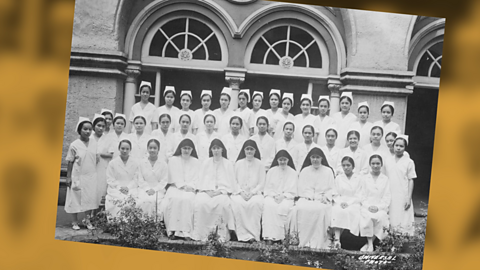
Alison Bennison - Working as a NHS nurse. video
This short film for primary schools follows Alison Bennison's journey to Britain from Barbados in 1960, to train as a nurse and work for the National Health Service. The story is told by Alison's granddaughter, Lindsey, and nine-year-old Dontay.
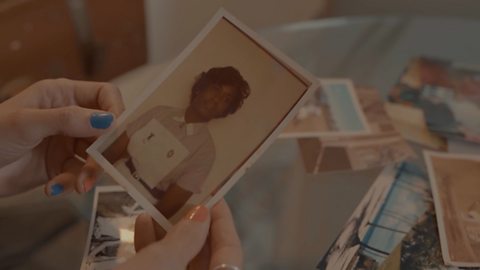
Newsround
The latest resources from Newsround to share in the classroom.
